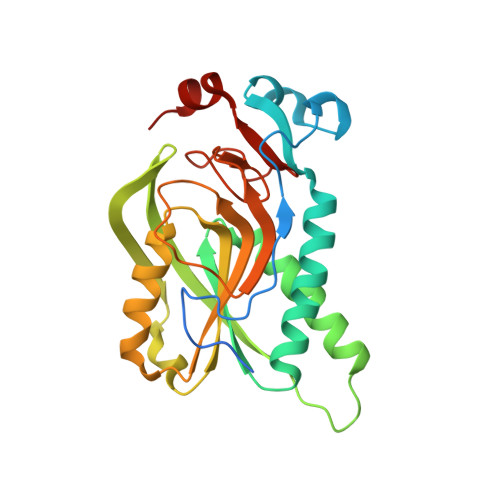Acyclic Immucillin Phosphonates: Second-Generation Inhibitors of Plasmodium falciparum Hypoxanthine- Guanine-Xanthine Phosphoribosyltransferase.
Hazleton, K.Z., Ho, M.C., Cassera, M.B., Clinch, K., Crump, D.R., Rosario, I., Merino, E.F., Almo, S.C., Tyler, P.C., Schramm, V.L.(2012) Chem Biol 19: 721-730
- PubMed: 22726686
- DOI: https://doi.org/10.1016/j.chembiol.2012.04.012
- Primary Citation of Related Structures:
3OZF, 3OZG - PubMed Abstract:
Plasmodium falciparum, the primary cause of deaths from malaria, is a purine auxotroph and relies on hypoxanthine salvage from the host purine pool. Purine starvation as an antimalarial target has been validated by inhibition of purine nucleoside phosphorylase. Hypoxanthine depletion kills Plasmodium falciparum in cell culture and in Aotus monkey infections. Hypoxanthine-guanine-xanthine phosphoribosyltransferase (HGXPRT) from P. falciparum is required for hypoxanthine salvage by forming inosine 5'-monophosphate, a branchpoint for all purine nucleotide synthesis in the parasite. Here, we present a class of HGXPRT inhibitors, the acyclic immucillin phosphonates (AIPs), and cell permeable AIP prodrugs. The AIPs are simple, potent, selective, and biologically stable inhibitors. The AIP prodrugs block proliferation of cultured parasites by inhibiting the incorporation of hypoxanthine into the parasite nucleotide pool and validates HGXPRT as a target in malaria.
- Department of Biochemistry, Albert Einstein College of Medicine, Yeshiva University, Bronx, NY 10461, USA.
Organizational Affiliation:



















